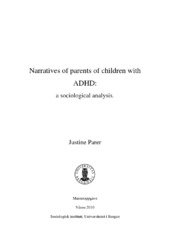| dc.description.abstract | This thesis examines and explores the issues around ADHD for parents of children with ADHD. Interviews with parents are analysed using qualitative methods, and supported by data from the Norwegian ADHD magazine. The first section gives a history of the development of ADHD, and an overview of the Norwegian ADHD Association. Next we consider sociological theories of medicalisation, deviance and the sick role; risk and expertise; and feminist work on ADHD. The method used is qualitative, using both semi-structured in-depth interviewing and analysis of the association's magazine, Stå På! These data were analysed using narrative and conversational analysis, with sensitivity to discourses. The interviews were with members from one of the Norwegian ADHD Association's local chapters. They were conducted in Norwegian and transcribed in standardised form. The interviews are considered as stories or narratives with meaning-creating and identity shaping power, and both healing and political motivation. Medicalisation is seen to have advantages and disadvantages, setting this work close to Solvang's ambivalence perspective" (2007) on medicalisation. Surprises and apparent contradictions in the data material were used to alert the researcher to the tensions and paradoxes around ADHD in the Norwegian setting. The analysis looks in detail at how the interviewees use narratives to make sense of and frame their situation, particularly through the hero/anti-hero trope. We see how ADHD has become part of a story about fate told genetic/familial terms, and how stigma is negotiated by building up a heroic image of both people with ADHD, and the people who fight the system on their behalves to get them the right help. We see how actors both make use of and reject medical authority and labelling. This research argues against the suspicion that parents (especially mothers) are primarily motivated to seek an ADHD diagnosis for their children for their own benefit. Further, the data suggests that the mother-blame' seen in other studies on is confidently rejected by mothers in the Norwegian context, and connects this to the rights ensured by the Norwegian welfare state. The interviewees interpret controversies around ADHD as reflecting a lack of information, which they are willing to work at helping to overcome. The parents are preoccupied not with the controversies around ADHD or what others make of their situation, but rather with their children's everyday well being, and future opportunities available to them. Stå På! magazine provides a stream of information about medications and the latest medical research, moral support and encouragement, stories and poems the members can relate to and recognise themselves in, and useful practical information about who to contact in the local area. This research shows how identity work done by parents of children with ADHD occurs in practice, and how they negotiate the stigma attached to actual ADHD behaviour as well as the medicalised stigma of the diagnostic label. Scientific research is used to establish credibility for the diagnosis and legitimate ADHD as a medical diagnosis, but once this is established they shift focus in favour of pedagogical and social practices that are helpful for assisting learning. Medical, psychological and social understandings of ADHD are therefore not seen as mutually exclusive, but rather as interwoven. ADHD as a... | en_US |
